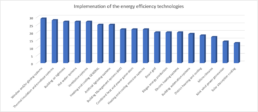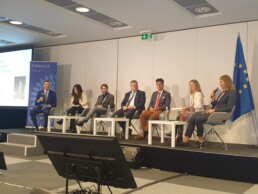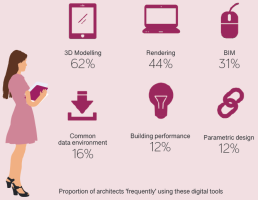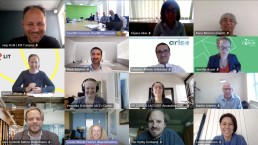Reaching a Sustainable Built Environment: Our Analysis
We just published the Report: “European roadmap: BIM applied to energy performance”.
The report provides inputs to develop a roadmap to achieve the correct development of a workforce ready to face the challenges of climate changes. The report starts recalling the requirements already defined in the European directives dealing with energy performance, the use of renewable energy sources, and digitalisation. Then, starting from the outputs of the previous deliverables, the roadmap summarises the knowledge, the skills and the competences needed both on the demand side and the offer side to obtain more resilient buildings to climate change with a decreased use of natural resources.
The roadmaps intend to ensure that current and future stakeholders interested in increasing the competences in the energy and digital domains, guarantee that existing and future training materials are adequate and continuously adapt to change. The roadmaps start from an in-depth analysis of the status quo in the participating countries.
The roadmaps should allow any company, public administration, and individual to fill the gap of competences and take advantages of all innovative energy and digital technologies.
In all the partner countries there is legislation supporting both the use of renewable energy sources and the improvement of the energy performance. Digitalisation is not always compulsory, but there are many initiatives to increase the competences in this domain starting from the public tenders where the use of BIM is becoming required in many countries. Consequently, we expect a huge future increase in the demand of digital competences needed in all the supply chain.
To provide the basis for the development of national roadmaps we considered a matrix where we suggest the level of knowledge/competence of the different targets for each technology. Digitalisation should be considered an instrument and not a final goal and should be applied by any blue and white collar of the building supply chain during its whole life cycle.
The goals of the directive are the same in every country. However, some countries are a few steps ahead in its implementation. To ensure the achievement of the same level by all, it is essential to promote the implementation of new technologies on both the demand and the offer side.
Based on a survey circulated among the project partners, we can make some interesting assumptions.
There is a strong correlation between the quality of the national VET (Vocational, Educational and Training) and LLL (Life-Long-Learning) systems and the use of technologies related to energy performance in buildings. North European countries developed more reliable training systems, and as a consequence they also make a better use of RES and technologies for energy efficiency. There is a persistent need, in all countries, to facilitate the use of more innovative technologies, which are still rarely taught in formal training.
In the following two diagrams we can observe the level of implementation of the different technologies considering the average of the different countries.
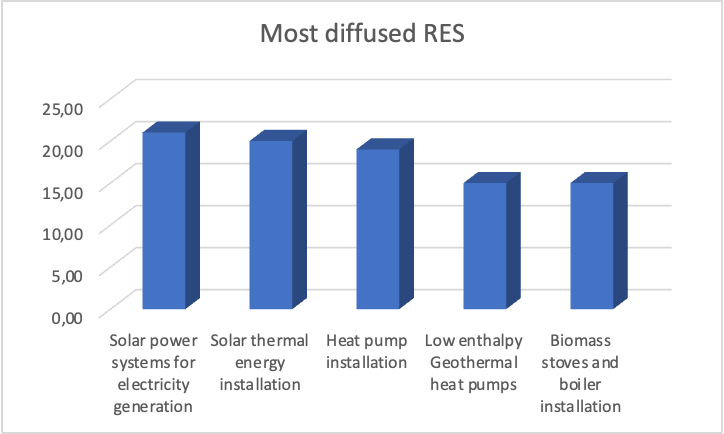

The ARISE platform can provide the support needed to achieve a higher maturity level in any sector and for any target as it is based on micro-competences. Thanks to the platform, the new technologies can be introduced directly by their producers. They can use it as a mean to provide training materials to be able to design, install and maintain new equipment and/or materials that can improve the energy performance of buildings.
The implementation of digitalisation shows that the problem is more related to the lack of a full maturity on the demand side. Designers are usually ready to implement digitalisation as it facilitates their work, but if the demand of public administration and both public and private owners does not increase, it cannot be fully implemented in the supply chain. The consequence is that the owners cannot profit from the benefit of managing all the information linked to their assets in order to decrease the cost of management and maintenance.
In the following diagram we can observe the different levels of maturity as average of the situation in each of the partners’ countries.

If the constructors do not implement the model received by the designers with the information of the products and equipment used and installed, the owner gets only marginal benefit from the BIM model produced by the designer. Therefore, there is a strong need to increase the comprehension of the benefits introduced by the full implementation of BIM in the supply chain. This analysis is also useful for training program developers and providers, providing them with directions on how to profile their programs.
In this case too, the ARISE platform can be beneficial as the European chapters of buildingSMART international are working for an agreement aimed at increasing awareness of the benefits of BIM along all the supply chain using the training materials developed for the individual qualifications available for free to everyone.
For more information, download the Report here.
Digital Construction Conference 2022 – Towards Construction 4.0 and the future of this sector in the digital era
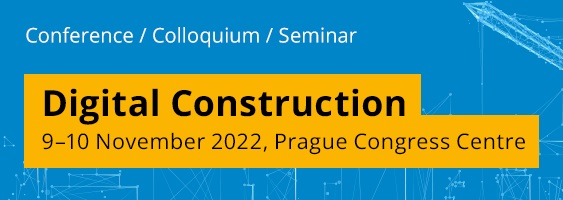
On November 9th and 10th, the president of IBIMI-buildingSMART Prague participated in the "Digital Construction conference” organized by the Czech Ministry of Industry and Trade in Prague, in collaboration with buildingSMART Czech Republic, with the goal to outline the possible development paths of the sector towards Construction 4.0 .
Many representatives of buildingSMART International and of the individual national chapters attended the conference, confirming the importance of the role played by our community in the digital transformation of the building supply chain.
The construction industry is still the least digitized sector of all and, at the same time, one of the largest contributors to GDP in all European countries. Add to this the stagnant levels of labor productivity and the urgency of undertaking profound changes becomes evident.
The main purpose of this meeting was to find new solutions to stimulate the flow of data in the sector and accelerate construction processes through Building Information Modeling (BIM) and improve the technological and data ecosystem of the construction industry.
No less important, the other topics discussed included the introduction of digital transition and BIM in the public sector, the revolution in the acceleration of building permit processing, robotization, automation and prefabrication in the construction ecosystem.



The good news is that much-needed change is already underway. After decades of under-digitalization, the construction sector seems ready to start a new era. New analyzes of the construction technology ecosystem uncover emerging trends, solutions, and a growing universe of technology use cases that are revolutionizing the way we plan, design, and execute construction projects.
The development of robotics and 3D printers will be solutions not only to the lack of workforce in the construction industry but also to problems related to the safety of workers. For instance, for the reconstruction interventions in risk areas, a "hot" topic also supported by the CECE (Committee for European Construction Equipment https://cece.eu/) in relation to the recent events in Ukraine.
The discussion with Katharina Knapton-Vierlich, the new representative of DG Growth H1 construction, on "digital transition and BIM in the public sector", was very interesting. The goal is to identify a common digital development strategy between the Member States and the European Commission, which would support it with specific funding programmes. Topic of extreme relevance for buildingSMART. For this reason, the dialogue started in Prague will be deepened with the Commission during the buildingSMART summit to be held in Rome next March.

Extremely interesting was also the European Commission initiative on the Digital Building Logbook, with the goal of promoting transparency and greater availability of data for a wide range of market operators (property owners, tenants, investors, financial institutions and public administrations). The idea is to provide a guideline that catalogs and stores all the information deemed important for a Digital Building File in a format that synchronizes the methodologies used in the various member countries, also through R&I projects for the implementation of the Digital Register financed by the Commission.
At the end, it was also discussed the impact of this transformation on human resources, focusing in particular on training. The digitization of the supply chain must not be perceived as a threat by workers in the sector, but recognized as a way to improve the image and the working conditions in the industry. The right training courses and the right skills will in fact make the sector more attractive to younger workers. And it is precisely in this direction that buildingSMART International is going with the work at the tables of the Professional Certification Program (PCERT), the professional qualification program designed to provide a certificate compliant with local regulations and at the same time having international validity on skills in the BIM and openBIM.
Many of the points raised during the conference in Prague will be the subject of further debate and study at the buildingSMART International Standards Summit in Rome. We invite you therefore to continue following us and to join us on the occasion of the Summit.
SAVE THE DATE: buildingSMART International Standards Summit - Auditorium della Tecnica, Rome – 27/30 March 2023
Giulia Riccardi
Anna Moreno
Caterina Nissim
Digitalisation: what is changing for architects?
An interview with Veronika Schröpfer, Head of EU Research Projects at the Architects’ Council of Europe
>> Digitalisation is changing the work of architects around the globe. At the moment there are around 560.000 architect in Europe, most of these working alone or in small offices. SMEs have the advantage to be quicker to adapt to new technologies and tools. Architects have shown themselves to be extremely willing to learn, more than half of those using each tool are self-taught. Architects are much more likely to use new tools out of personal or business interest than due to client or regulatory requirements. This shows that architects are enthusiastic to adopt digitalisation tools.
The role of the development of digital competences in the building domain
>> Architects contribute around 17 billion Euros to the EU economy (ACE, sector study 2020). Nevertheless, ACE has advocated for more diversity in software and tool providers. Annual licence fees for software can be a barrier for micro sized architecture practices. They cannot afford various licences for similar tools but different providers depending on the project. Hence the interoperability of tools and platforms are vital.
>> You can see in our 2020 ACE sector study, that there has been a proliferation of new digital tools which the architectural profession is adopting. A majority of architects use 3D modelling tools ‘frequently’, and nearly half use rendering tools frequently. About one in three architects frequently use BIM on their projects. An important aspect is that most architects use the tools out of their own choice.
The impact of putting in place a recognition system valid at European level
>> Our 2020 ACE Sector Study has revealed that the vast majority of architects taught themselves how to use digital tools.
No more than 35 per cent received formal training for any of the tools, although more received informal training. On average architects spend about 20 hours of official Continuing Professional Development (CPD) per year. CPD is a structured way of maintaining and developing the competence as a qualified professional by engaging in regular learning activities. For a training recognised and valid at EU level it should be endorsed by ACE Member Organisations in various EU Member States and meet the minimum agreed European quality standards. Various European training bodies should recognise each other’s CPD, making it easier for architects to work in the countries they choose. Usually, one learning hour equals one international CPD credit. Therefore, we joined the ARISE project, as it will work on the recognition of the CPD competences through the development of a platform based on microunits certified with blockchain.
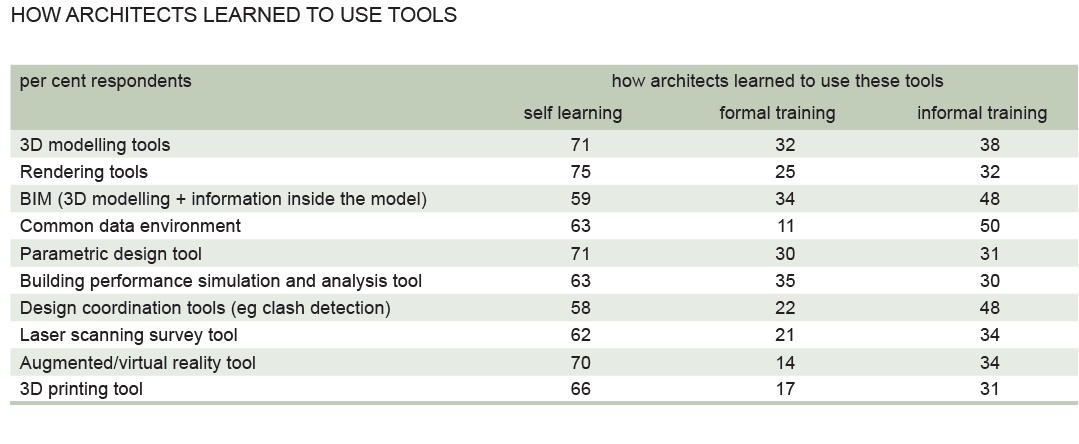
Dr. Veronika Schröpfer, Head of EU Research Projects at the Architects’ Council of Europe
Images and sources of numbers from the ACE Sector Study: https://www.ace-cae.eu/fileadmin/user_upload/2020ACESECTORSTUDY.pdf
ARISE Launch
Belfast Metropolitan College launched their new £1.12 million European digital construction project, ‘ARISE’ in the 2 days KICK OFF meeting 1st and 2nd September 2021.
ARISE aims to revolutionise the learning process by changing the face of delivery and recognition of sustainable energy skills in the building sector.
ARISE’s mission is to support the twin transition of the design and construction sector and to contribute thereby to the European Recovery and Resilience Plans 2021 -2027, by providing the building sector professionals with digital and sustainable energy skills of the future, along with demand-side guidelines for marketable appreciation of skills and exploitation of benefits thereof.
The nine partners in the project consortium are:
- Belfast Metropolitan College, Northern Ireland
- Technological University Dublin, Ireland
- Institute for Research in Environment, Civil Engineering and Energy, North Macedonia
- ISSO, Netherlands
- Architects’ Council of Europe, Belgium
- IBIMI Institute for BIM, Italy
- Building Changes, BV, Netherlands
- Copenhagen School of Design and Technology, Denmark
- Instituto Superior Technico, Portugal.
On the opening launch day on Wednesday, September 1, Belfast Met Innovation Manager and ARISE Programme Manager, Paul McCormack gave an introduction and outlined the challenges and objectives for the 30-month programme.
Louise Warde Hunter, Principal and Chief Executive of Belfast Met also addressed the opening day audience with: “Today’s ARISE launch reinforces Belfast Met’s commitment to engage in international partnerships and applied Research & Development, working in innovative ways with industry to meet the emerging skills needs of the economy at home and abroad. “
“Our People, our Planet, and our Partnerships are key to addressing the interconnected challenges of sustainability at TU Dublin. The ARISE project creates a positive impact by addressing real-world challenges in the construction sector through the upskilling of individuals to reach their infinite potential. ARISE leverages learning post-Covid, by offering bite-size educational units through a digital mobile curriculum to enable learning opportunities that are accessible and sustainable in our daily lives.” Stated Ms Jennifer Boyer, Vice President of Sustainability, Technological University Dublin, one of the nine European partners on the project, which has Belfast Met as the lead partner.
The funding for the project was gained through the EU Horizon 2020 Work Programme. Ms Amadine De Coster-Lacourt, Project Advisor, (CINEA), European Climate, Infrastructure and Environment Executive Agency, highlighted that: “ARISE will contribute to the Green Deal and the Renovation Wave objectives by facilitating recognition of sustainable energy skills in the built environment and increasing demand for those skills”.
The distinct work packages work to be carried out by the partners were discussed and detailed Work Packages.
- WP1 MANAGE Belfast Met
- WP2 BENCHMARK energy & digitalisation skills IBIMI - Italy
- WP3 DESIGN framework ISSO The Netherlands
- WP4 DEVELOP autonomy e-engine KEA - Denmark
- WP5 FILL agility e-tools TU Dublin
- WP6 PILOT Digital Pathway energise Belfast Met
- WP7 REPLICATE market implementation IECE Macedonia
- WP8 COMMUNICATE dissemination & exploitation ACE Belgium
Martin Lennon, Director, (OHMG), O Hare McGovern stated: “The early involvement of OHMG with (previous project) BIMcert was the platform that escalated our BIM journey, ensuring we remained at the forefront of digital innovation.
“ We are delighted to once again join with BMET and their international partners, at the start of their ARISE project journey. The result of this partnership will ensure OHMG have a skilled workforce who will have the knowledge, experience and competencies to deliver on the Government’s Construction 2025: Strategy”.
Mark Baldwin, Building Smart International, in Switzerland added: “Competency assurance is a significant aspect contributing to the success and sustainability of the digitalization of the built asset industry.”
ARISE will revolutionise the learning process by monetizing skills development and learning exchange with a digital system based on skills recognition rather than accreditation. The training and transaction system developed by the project will reward learners as they achieve competence at a certain level with the cryptocurrency for skills exchange - CERTcoin – the innovative currency of skills and learning of the design and construction sector embracing today’s digital transformation benefits. This reward-based on skills and time credits will be stored in an Individual Learning Account and can be used as digital points accumulation for example in a skills barometer or for exchanging it into valid certificates. It will be an easier accessible, less time consuming and still competitive way to up-skill design and construction professionals and workers, as well as market demand side – public administration, clients and owners.
ARISE will apply digitalisation both as a learning method and as a framework of job-based construction skills of the future, multiplying the effects of the green transition skills. The novel training method will make the learning process attractive and effective, facilitating its accessibility through a mobile (smartphone) and a user-friendly web-based platform. The intervention/learning progress will be achieved in a scalable way, in bite-sized skills delivery. ARISE will apply digitalisation and the earning of learning credits in a "step by step" recognition of competencies, as an accelerator to empower demand for sustainable energy skills in the desing and construction sector, and as an enabler of formal certification. This system will be employed based on blockchain procedures to instil transparency and trust.
Within 30 months, until February 2024, partners will work on the development and demonstration of the innovative on-demand training scheme for digitalisation towards sustainable energy skills, aimed at both supply and demand sides.
